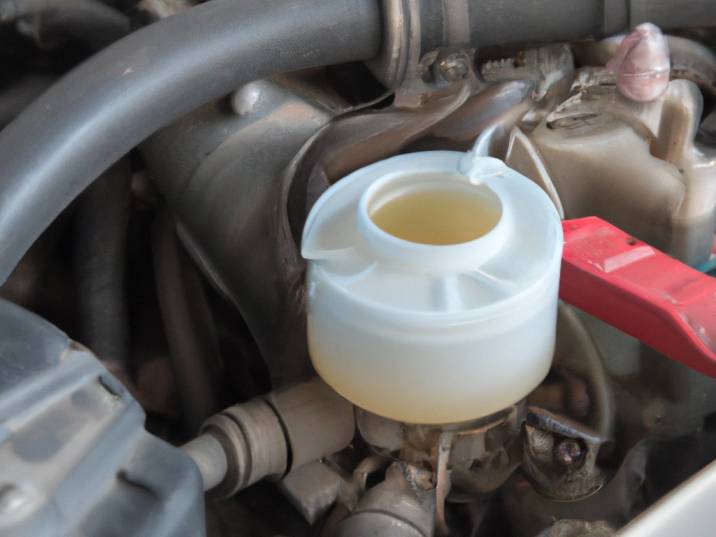 Brake fluid is a crucial component of your vehicle’s braking system, responsible for transmitting the force applied to the brake pedal to the brakes themselves. Without brake fluid, your brakes would not be able to function, leaving you unable to slow down or stop your vehicle.
Brake fluid is a crucial component of your vehicle’s braking system, responsible for transmitting the force applied to the brake pedal to the brakes themselves. Without brake fluid, your brakes would not be able to function, leaving you unable to slow down or stop your vehicle.
In this guide, we will discuss the importance of brake fluid, its role in the braking system, and how to maintain it for optimal performance and safety.
What is Brake Fluid?
Brake fluid is a hydraulic fluid that transmits force from the brake pedal to the brakes themselves. It is a non-compressible liquid that is specifically designed to withstand the high pressures generated by the braking system. Brake fluid is typically glycol-based or silicone-based, with glycol-based fluids being the most common.
How does Brake Fluid Work?
When you apply pressure to the brake pedal, the force is transmitted through the brake lines to the brake calipers or wheel cylinders. These components use the force to squeeze the brake pads or shoes against the rotor or drum, generating friction that slows down or stops the vehicle. Brake fluid acts as the hydraulic medium that transfers the force from the brake pedal to the brakes themselves.
Importance of Brake Fluid
Brake fluid is critical to the safe and reliable operation of your vehicle’s braking system. Without it, the braking system would not be able to generate the force necessary to slow down or stop the vehicle. Maintaining the proper level and quality of brake fluid is essential for ensuring that your brakes operate as they should.
Brake fluid also plays a role in preventing corrosion and rust within the braking system. Over time, moisture can enter the brake lines, causing corrosion and rust to form within the system. This can weaken the brake lines and components, reducing the overall effectiveness of the braking system. By maintaining the proper level and quality of brake fluid, you can help prevent moisture from entering the system and protect against corrosion and rust.
Types of Brake Fluid
There are two main types of brake fluid: glycol-based and silicone-based. Glycol-based fluids are the most common and are used in the majority of vehicles on the road today. Silicone-based fluids are less common and are typically used in high-performance or racing applications.
Glycol-based fluids are further classified into two categories: DOT 3 and DOT 4. DOT 3 fluids have a lower boiling point and are typically used in standard passenger vehicles. DOT 4 fluids have a higher boiling point and are often used in high-performance vehicles or in situations where high temperatures are expected.
Maintaining Brake Fluid
Maintaining the proper level and quality of brake fluid is essential for ensuring the safe and reliable operation of your vehicle’s braking system. Here are some tips for maintaining your brake fluid:
- Check the brake fluid level regularly. Most vehicles have a clear plastic reservoir that allows you to easily check the level of the brake fluid. Make sure the level is between the “min” and “max” marks on the reservoir.
- Inspect the brake lines and components for leaks or damage. If you notice any signs of damage or leaks, have them repaired immediately.
- Have the brake fluid flushed and replaced periodically. The manufacturer of your vehicle typically recommends a specific interval for brake fluid replacement. It’s essential to follow this recommendation, as old brake fluid can become contaminated with moisture, reducing its effectiveness and potentially causing damage to the braking system.
- Use the proper type of brake fluid. Consult your owner’s manual or a qualified mechanic to determine the correct type of brake fluid for your vehicle.
- Avoid mixing different types of brake fluid. Different types of brake fluid have different chemical compositions and mixing them can lead to reduced performance and potentially damage the braking system. Stick to the recommended type for your vehicle.
- Keep the brake fluid reservoir clean. Dirt and debris can contaminate the brake fluid, reducing its effectiveness. Wipe down the reservoir and cap with a clean rag before adding new brake fluid.
- Be aware of the signs of contaminated brake fluid. Brake fluid that has become contaminated with moisture or debris can cause the brakes to feel spongy or less responsive. If you notice a change in the feel of your brakes, have them inspected by a qualified mechanic.
- Have the brake system inspected regularly. A qualified mechanic can inspect the braking system for leaks, damage, and other issues that can affect the performance of the brake fluid.
In summary, brake fluid plays a critical role in the proper operation of your vehicle’s braking system. Maintaining the proper level and quality of brake fluid is essential for ensuring the safety and reliability of your vehicle’s brakes. Regularly inspecting and maintaining your brake fluid can help you identify and address potential issues before they become serious problems. Be sure to follow the manufacturer’s recommendations for brake fluid replacement and use the correct type of fluid for your vehicle to ensure optimal performance and safety.
Leave a Reply